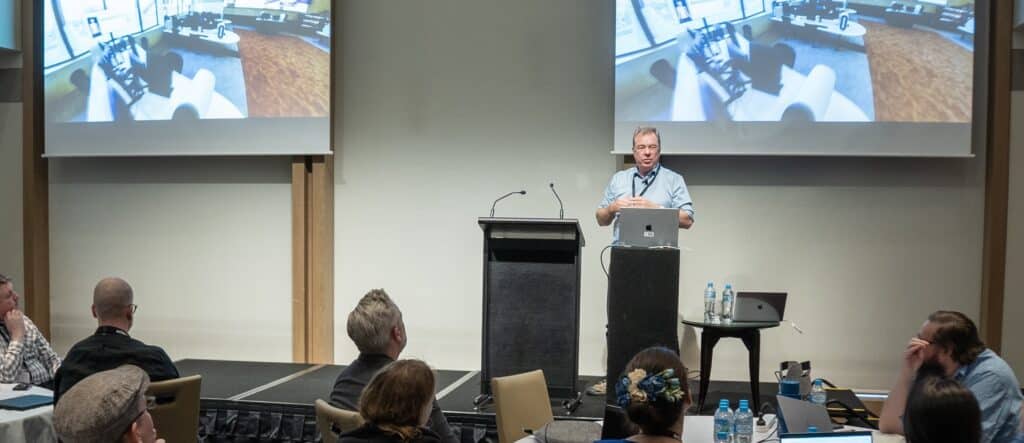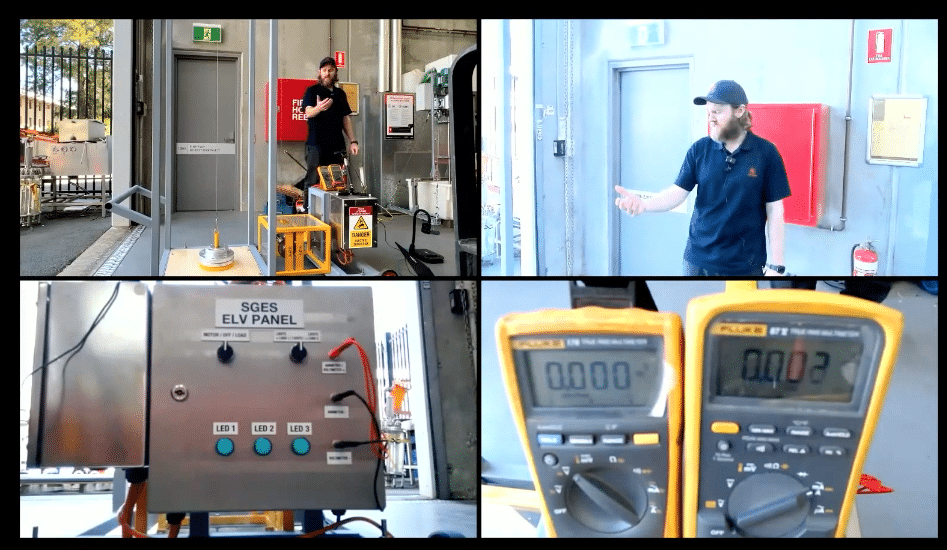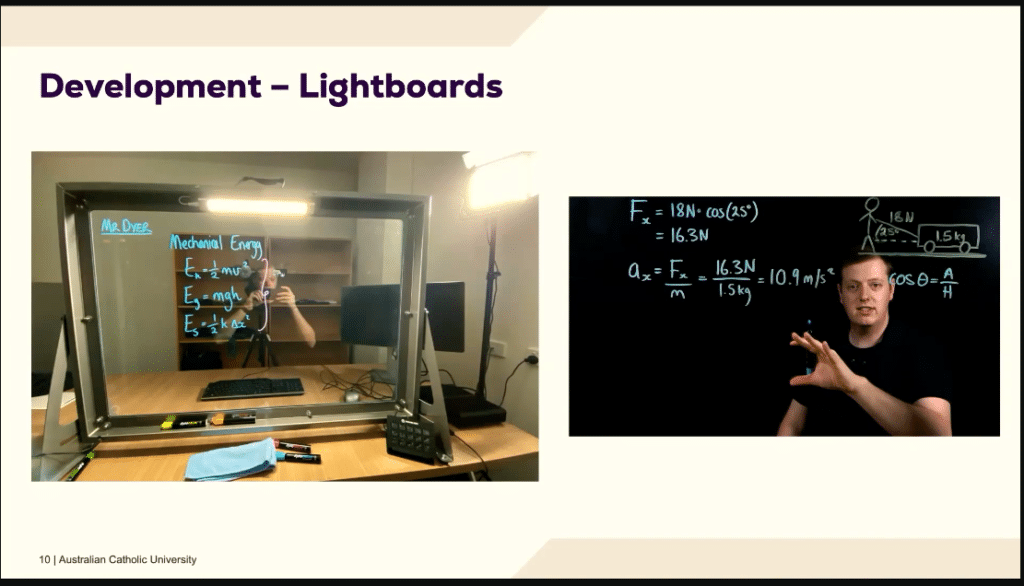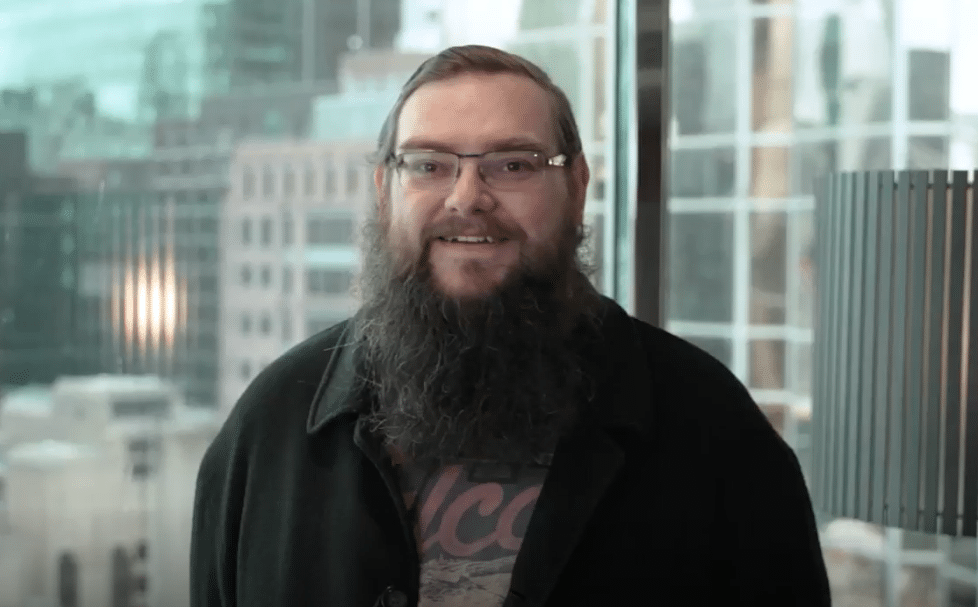
Community, Connection, Inspiration : 18th Echo360 A/NZ conference
Alison Maloney, February 2024
In late 2023, the annual A/NZ conference saw community, connection and inspiration take centre stage as we celebrated the coming of age of the conference at 18 years. Join me as a I share some highlights from the event.
Murad Velani, CEO and President of Echo360 used his opening address to share how the Echosystem had been further brought to life in 2023 with the release of EchoPoll and EchoExam, and by acknowledging the rapid developments also happening with EchoVideo.
Velani emphasised Echo360’s commitment to partnership and community. He shared the company’s vision of engaged, evidence-based and equitable learning, and our mission to champion remarkable learning experiences for instructors and learners in every learning environment.
“As the world gets more complex, we are focused on building smarter, resilient, secure and compliant solutions that enables anywhere, anytime learning and teaching in the way that our partners want it”.
Navigate the page
Our Partners from UQ, ACU and Canterbury Explore Echo360’s Engagement Tools
Echo360’s E3 tech grant winners were front and centre throughout the conference, starting with a hugely engaging presentation from the team at the University of Canterbury, lead by Dr Brad Hurren and supported by Donna Thompson and Pablo Taylor. Hurren shared real-life teaching examples from his anatomy classes as he demonstrated the uncomplicated process of using EchoPoll in the classroom, and shared some of the benefits of having formative assessment results at his fingertips, enabling immediate adjustments to his teaching. In 2024, Hurren and the team at Canterbury are going to continue to look at polling in class, and in particular, the elements of learning design that need to be considered in a more active, just-in-time assessment and learning-focused class.
As the first partner in the region to adopt EchoPoll as an enterprise solution alongside EchoVideo, The University of Queensland (UQ) was represented by Dr Huong Nguyen and Lucinda Ramsay who walked us through their implementation journey.
Gen Z students are entering university with higher expectations of diverse opportunities. With in-class polling, particularly on mobile devices, ‘students are reporting finding it more comfortable with everyone together and communicating as well as promoting active discussion, they feel less intimidated responding to questions they may, or may not, know the answers to. They also reported appreciating the just in time corrections and explanations of misunderstandings.’ Graze, 2023.
Nguyen discussed how seamless it was to integrate EchoPoll into their learning environment and workflows, with members of e-learning, IT, and the Library desk all working together to achieve success. She also commented on the strategies they were using to keep the cognitive load low for learning designers, instructors and students, and how important that is for adoptio
Dr Huong Nguyen,
Senior e-learning advisor, The University of Queensland
With Echo360’s technology being focused on anytime and anywhere learning, a pervasive theme of the conference was the need to re-consider instructional design when using more active learning and engagement tools with students.
During his presentation, Dr Kamanashis Biswas from the Australian Catholic University (ACU), discussed some of the challenges that international students (in particular) were finding with asynchronous learning opportunities in online course delivery – such as lack of sense of belonging, immediate feedback and accountability – leading to some students only grasping surface-level knowledge and experiencing decreased motivation and interest in the learning process.
Biswas’ project looked at how integrating learning activities into the video content with an accompanying discussion tool could impact student engagement.
His findings showed that, whilst students need time to adjust to the new learning approach, there was a positive correlation between post-video and in-video tasks. For future use of the engagement tasks, they will also consider incentives for students to engage with the materials, such as linking their engagement to an assessment task.
As with Hurren’s findings with the engagement tools in EchoPoll, Biswas reports that it is crucial to consider learning design to foster higher student engagement with both learning materials and learning engagement tools.
Dr Kamanashis Biswas, Senior Lecturer in Information Technology, Australian Catholic University
Students as Partners at QUT
Every year with the E3 tech grants, Echo360 is delighted by the number of applicants who want to try something new. This year was no exception as Elizabeth Marsland from Queensland University of Technology (QUT) formed partnerships with students from previous classes in order to create learning materials to support current students.
Students were invited to record videos, sitting side-by-side with Marsland, explaining how they worked through certain problems and then conferring with her if they made a mistake on how to correct it. The current cohort reported significant benefits from seeing other students work through problems, and were enthusiastic about doing the same for the next year’s cohort.
One of the highlights of listening to Marsland talk about working with her students on this project was that it came closely after Associate Professor Jason Lodge had shared research that shows learners benefit more from watching a discussion between people than a talking head.
Look out for more on Liz Marsland and her innovative project in March!
Something a Little Different from Collarts and ACU
Cherie Wright and Seán Figgers from Collarts manage a project that offers Year 12 students the opportunity to study Creative Arts courses through Collarts while still at high school. The students can study certificates in subjects such as music, sound production or interior decoration, all the time learning the skills they need to work in creative industries as well as make a smoother transformation from school into higher education. As a two-person team supporting all K-12 schools involved in the programme, it is a difficult task for Wright and Figgers to visit every school and support every teacher involved in these VET courses. As part of their Echo360 Tech grant, Collarts explored creating induction videos for instructors and students involved in the programme using EchoVideo’s interactive media polls to increase engagement and assess the participants understanding of the programme’s requirement
Cherie Wright, VET Manager, Collarts
Dr John Mahoney at ACU has been working on an exciting project that provides feedback to instructors on the quality of their teaching in videos. Using the capabilities of AI, and assessing against some of the commonly understood principles of multimedia, the project explores how educators can receive feedback on elements of the speed, sound and content of a video presentation. Imagine teaching captured on video with AI-created feedback about elements within a presentation offering the opportunity for immediate growth and improvement – way before the end of semester student feedback forms come in!
Not only did we thoroughly enjoy Mahoney’s interactive presentation – giving us an opportunity to test our multimedia knowledge – we’re excited to see where the project goes. We’ll share more as we learn more.
The Third Space at UWA and Murdoch University
The Third Space has always referred to a space that was not home or work but one where you turned up voluntarily – think coffee shop, park or library. It is also a term being adopted by higher education to define the work of teams that consist of professional learning and teaching staff (educational technologists, learning designers etc) partnering with teaching academic staff.
Ezrina Fewing, Manager of Capability Development, is a leader in the third space team at the Educational Enhancement Unit at The University of Western Australia (UWA), and began her presentation by sharing the beliefs that drive her work: “I believe that by embracing change, fostering partnerships and valuing lifelong learning, we can positively influence the future of higher education and provide exceptional learning experiences for both our learners and educators.”
She walked us through how the key pillars – design, connection challenge, encouragement, reflection and assemble – form the basis of the work the team undertake with UWA’s Instructors.
Fewings highlighted that Professor Wendy Erber’s changes to her teaching were the result of the partnership formed between Professor Erber, Irene Lee (an educational technologist with the EEU), and her students as she began her journey with virtual labs.
You can read more about Professor Erber’s journey HERE

For more than fifteen years, Martin Hill has been sharing the latest technology for recording classes with the Echo360 community, and this year was as impressive as ever. Hill walked us through the clinical capture spaces that he has set up at Murdoch University and how he and some of the lecturers have been using EchoVideo’s quadravision capability to share increased media options for students watching online.
Hill also described the learning and teaching technology available in the award winning Boola Katijin building, including recording tools, a comprehensive integration with Microsoft Teams, and how easy it is for students to collaborate on the technology installed in classrooms, as well as the state of the art VR and AR rooms. No wonder students at Murdoch can’t wait to come to campus!
Designing and Rolling Out Self-Service Studios Across Seven Campuses at ACU
We all know that Instructors became very used to recording their classes on a desktop computer during the lockdowns of 2020; and when they returned to campus, Jacob Dyer, a multimedia developer at ACU, was tasked with creating self-service studios to support their needs with spaces suitable for more professional recordings: lighting options, adjustable camera height, good quality sound tools, as well as availability of tech such as EchoVideo and Lightboards.
As demonstrated by Dyer, some instructors used the studios to simply record their slides and audio; others recorded an introduction with themselves in-camera and then reverted to slides + audio only; and there were those who used the lightboards, recording themselves for the entire session and even using MS Powerpoint overlay.

In the studios’ first year, ACU had over 1,000 bookings from 187 staff members with about 1,500 hours of recordings. Some staff reported that the studios had improved the quality of their teaching, while students noted the recording consistency across campus and units.
Keynotes from Associate Professor Jason Lodge, Professor Wendy Erber and Patrick Stoddart
The 2023 conference’s keynotes were diverse: one speaker was a formerly-tech averse academic sharing her journey from student to teaching with technology; another, a research academic widely recognized during 2023 for his work with AI and TEQSA; and an Associate Director responsible for the Academic Systems and Digital experience at his university.
Anyone following the stories around AI over the last year knows Associate Professor Jason Lodge’s name. Alongside his research, he has written and spoken on the topic of AI and assessment, worked extensively with TEQSA, and is one of the editors of AJET. The power of his keynote address was to remind us of the large number of myths around education and what the latest research says about learning and teaching and why it matters, such as:
- Learning styles (visual, kinesthetic and auditory learners) remains a myth; we should use the modes together when possible.
- Active learning is here to stay.
- There is some truth to laptops in class being bad for learning, and mostly because of the distraction to students around them UNLESS those laptops are integrated into the class and used for purpose.
- The jury is currently out on whether Google/ChatGPT is making our students stupid. Probably not, but it might be making them feel more confident in their own knowledge and they’re therefore not spending appropriate time on learning.
One key reason we need to care about all of this is that we are providing increased flexibility in higher education for students to study how/where it suits them, and we’re therefore increasingly expecting them to direct their own learning. Lodge’s observations shows that students are reporting studying 50% of what they should be, and students don’t necessarily know how they are going. The run-on impact of the current student insecurity is the clear split between those students who aren’t able to self-direct their learning and those who have; the former are performing very poorly academically, and the latter are succeeding.
Want to hear a little more? Here is Assoc Prof Lodge’s presentation from THETA 2023
A Rhodes scholar, a beloved professor and a leading name in haematology, Professor Wendy Erber, from UWA walked us through how the lecture has changed – and not changed – since it began and how, sharing personal reflections on the last forty years as teaching moved from the gestetner, to the overhead projector, to online. Her generosity and vulnerability to share her failure as well as her success in learning and teaching is what stands her apart.
Echo360 has held eighteen annual conferences in A/NZ and, as Patrick Stoddart, Associate Director Academic Systems and Digital Experience at The University of Melbourne has been to all of them, we celebrated his 18th with him in 2023! With eighteen years comes the full respect of the company and willingness to hear him tell it like it is.

The most contentious topic of 2023 was AI, and Stoddart used his time to share some of his ideas about where media transcripts – when coupled with AI – could further support learning and why increased accuracy will make a difference. Stoddart reminded us that lectures, when done well, are stories that support student learning. The media transcript can be partnered with AI tools to create study guides, generate learning activities and potentially Q&A Tutor Bots. While acknowledging the difficulties others have faced bringing the ideas to fruition, Stoddart discussed the possibilities of transformative learning opportunities for students if we could support them with 1:1 coaching from that content.
Echo360’s Product Roadmap featuring Manoj Rana and Hannah Petty
We know that one key reason our partners attend the Echo360 conference is to hear from – and be heard by – the Echo360 leadership and product management teams who join the conference every year. A highlight for all at this year’s conference was the chance to hear how the development teams and product managers work together to create the features we love in EchoVideo. Eric Banker, Hannah Petty and Damyon Wiese discussed how they worked together to create the latest features to go live in 2023; playlists, H5P integration, copyrights and more.
We also heard from Manoj Rana, Echo360’s Chief Technology Officer about the importance and future of AI at Echo360: “Of all the use cases for AI and all the excitement going around it, the learning environment has the most compelling use cases overall. If you look at what’s happening in the education industry, there’s a time crunch for instructors; they are busy dealing with many new technologies. With the hybrid and online environments, the students are struggling to adapt as well. AI is a perfect technology to address some of these constraints by freeing time from routine tasks, allowing instructors to focus on valuable student interactions, and we are excited to leverage it in all our products.”
And of course, a community conference wouldn’t be ‘the place to be’ if not for the roadmap for the Echosystem solutions in 2024.
Hear from Hannah Petty, Senior Product Manager, about why EchoVideo is putting accessibility at the center for 2024.








